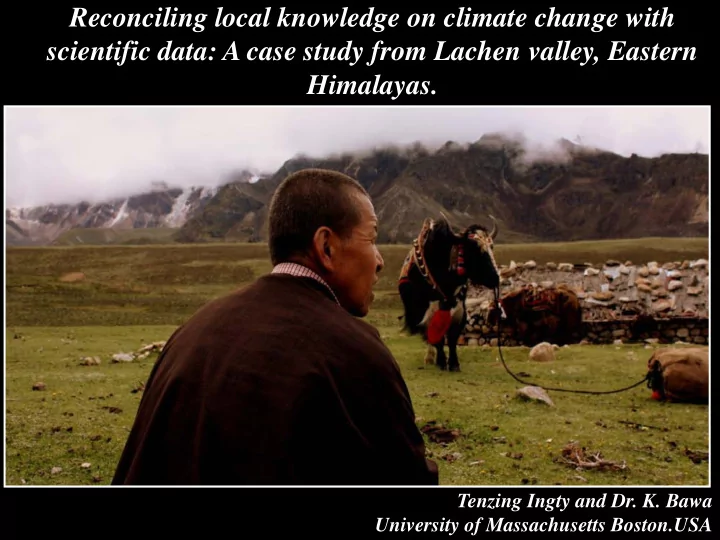

Reconciling local knowledge on climate change with scientific data: A case study from Lachen valley, Eastern Himalayas. Tenzing Ingty and Dr. K. Bawa University of Massachusetts Boston.USA
INTRODUCTION Climate Change and the Himalayas • Increased by 1.5° C and annual precipitation by 163mm between 1982 and 2006 • Lack of baseline data
INTRODUCTION Climate change and Indigenous peoples • Indigenous people canary in the coal mine. • SCALE Climate change and human responses • TEK can be used as long term baseline datasets developed over years of trial and error
STUDY SITE
STUDY SITE
D O K P 3800 m A amsl to about 7000 m amsl
L A C H E N 2000m P amsl A to about 3800m amsl
Migratory route of Dokpas Migratory route of Lachenpas Summer Migration Summer Migration Winter migration Winter migration
Edible Aromatic Medicinal Rhododendron Mecanopsis Arisaema anthopogon horridula griffithii
Dependency on livestock products Making yak fur carpets and Dokpa Making man preparing the yak tail for selling yak hard sale butter cheese for sale
The Dzumsa • Recognized by GOI in 1985 • Annually elected body • 12 village representatives ⁻ 2 Pipons (headmen) ⁻ 6 Gembos (advisors) ⁻ 2 Tsipos (accountants) ⁻ 2 Gyapons (messengers)
Dzumsa Dates for fodder Sowing and harvesting; Dates for collection selection of crops migration 1.Based on TEK Allows pasture Provides equal potentially higher yield re-growth over a opportunity for and productivity season putting up their 2. Co-ordinates winter reserves community’s effort to protect crops from freely roaming livestock
METHODS Participatory Rural Appraisal (PRA) • Focus Group Discussions -[n]=6 • Participatory and non participatory observations • Semi structured questionnaires [n]=44 - Lachenpas-35(around 15%) of 227 - Dokpas- 9 (60%) of 15
METHODS Semi structured questionnaires: 1. Observations 2. Perception 3. Implication 4. Impacts on their lives and livelihoods
METHODS • Certain precaution is necessary in conducting perception studies. - Sampling errors - Non-sampling errors and biases • To minimize biases ₋ The sample was drawn randomly ₋ The questions were framed in a way that it would not lead respondents to certain presumption or biases. ₋ Perceptions collected through household surveys were verified through focus group discussions and key informant surveys.
METHODS Data set for temperature • Climate Research Unit (CRU) TS2.1 dataset from the Tyndall Centre for Climate Change Research, School of Environmental Sciences, University of East Anglia in Norwich, UK. • Resolution: interpolated (on a 0.5 latitude-longitude grid) global monthly rainfall and temperature data from 1901 to 2002 (Mitchell and Jones, 2005).
RESULTS AND DISCUSSION Annual maximum temperatures Overall warmth Annual mean temperatures Increased by 0.51 o C Annual minimum temperatures Increased by 0.74 o C Increased 0.97 o C
RESULTS AND DISCUSSION Dokpa Lachenpa Spring Summer Autumn Winter
RESULTS AND DISCUSSION Annual mean summer temperatures Annual mean spring temperatures Increased by 0.34 o C Increased by 0.50 o C Annual mean autumn temperatures Annual mean winter temperatures Increased by 1.10 o C Increased by 0.94 o C
RESULTS AND DISCUSSION Yes No Don’t know L D L D L D L D L D L D
RESULTS AND DISCUSSION Yes No Don’t know L D L D L D L D L D L D
RESULTS AND DISCUSSION Yes No Don’t know L D L D L D L D L D L D
Thinner ice “Thinner ice makes crossing ice bridges more dangerous nowadays”
“During the monsoons rivers suddenly swell up making them more dangerous than before”
Reasons for observed changes
Reasons for observed changes
Impacts on grazing pastures
Impacts on Impacts on agriculture and the grazing pastures response and the response Dzumsa Dzumsa Lachen-9000ft/2730m (amsl) 1. Slaughter or sale Maize, cabbages, pumpkins of sheep banned for three years. Thangu -12,500 ft/ 3790m (amsl) 2. Prayer flags believed Carrots to decrease snowfall have been banned. Gochung-14500 ft/ 4390m (amsl) potatoes
Impacts on religious sentiments “The Mountains have been reduced to old balding men, with just a few wisps of white hair left at the top. We worshipped the mighty snow clad mountains; alas, our God, our culture is threatened.”
CONCLUSION • The results of our study confirm certain climate change indicators • Results conform to scientific findings from around the world, supporting the credibility of community perceptions • Traditional knowledge can be an important source of information • HOLISTIC APPROACH- Integration and feedback loops
CONCLUSION Flora of British Himalayan Journals Notes India by Sir J.D. Traditional of Naturalist by Hooker 1850- Ecological Sir J.D. Hooker- 1850 A.D 1872 A.D. Knowledge
4500- 5500 m amsl 3500- 4500 m amsl 2500-3500m amsl
Gentiana ornata Previous max alt: 4500m Now found at: 5212m Rheum nobile Previous max alt: 4500m Now found at: 4784m Bistorts macrophylla Previous max alt: 4500m Now found at: 4724m Primula primulina Previous max alt: 4500m Now found at: 4824m
CONCLUSION - Traditional peoples have much to offer the discourse on and actions countering climate change. - Empowered to exercise self-determination to deal with climate change that threatens their traditional livelihoods, indeed their very existence. - Local perceptions, adaptations, responses and solutions must be kept in mind while being inclusive of the traditional institutions like the Dzumsa to effectively develop and implement adaptation and mitigation strategies.
ACKNOWLEDGEMENTS • People of Lachen Valley and the Dzumsa • The Sikkim Forest Department • START- CDKN: Climate Development Knowledge Network • ATREE Small Grants Program sponsored by JOHN D. AND CATHERINE T. MACARTHUR FOUNDATION and ASHOKA TRUST FOR RESEARCH IN ECOLOGY AND THE ENVIRONMENT • NORAGRIC Small Grants Program
Thank you
Recommend
More recommend